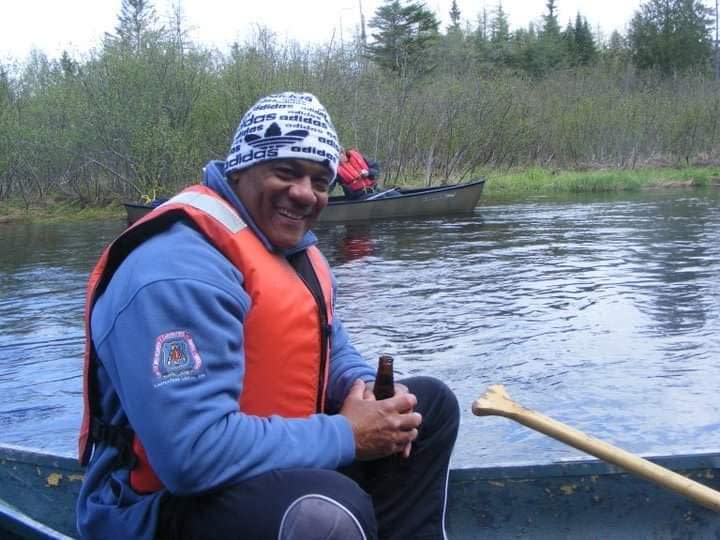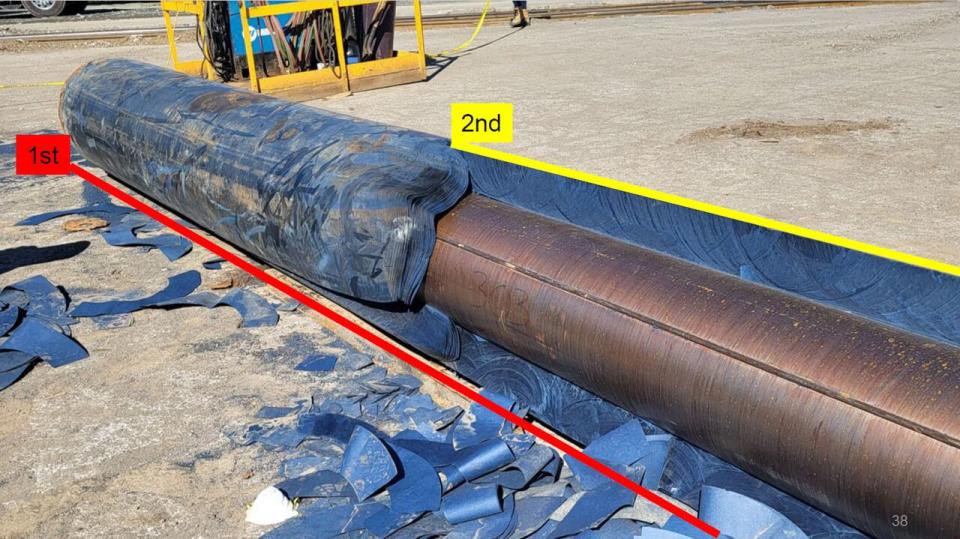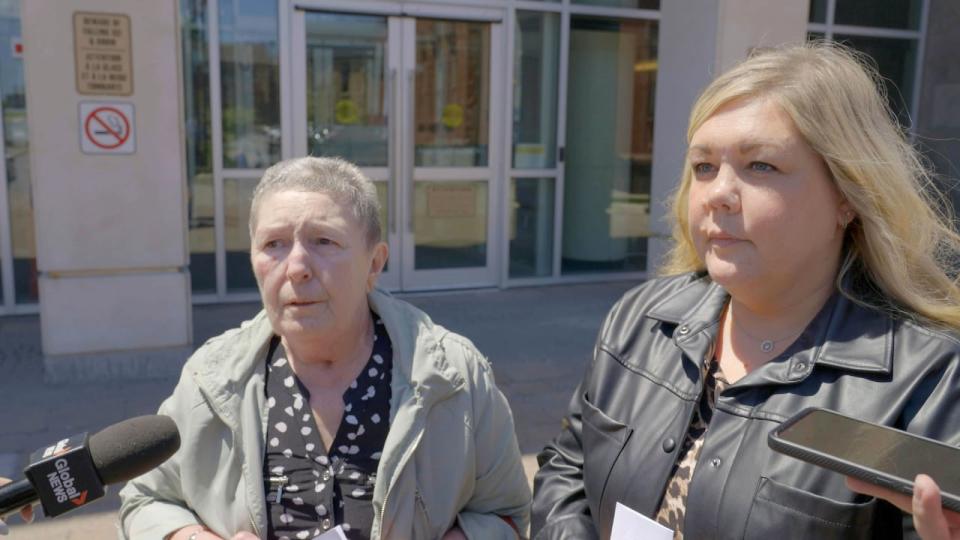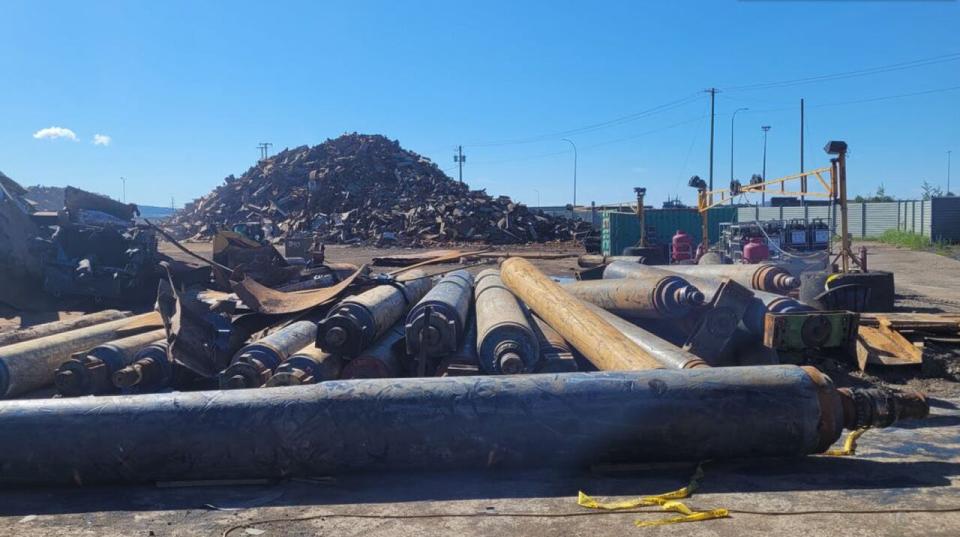Inquest into death at AIM scrapyard ends with 4 recommendations from jury

A coroner's inquest into the death of a worker at the American Iron & Metal scrapyard in Saint John nearly two years ago has ended in four recommendations focused on safety, communication, purchasing and inspection to try to prevent future deaths or injuries.
The jury came up with the recommendations after deliberating for about three hours on the testimony of 16 witnesses regarding the fatal injury Darrell Richards sustained at the west-side metal recycling facility on June 30, 2022.
Richards, a contractor, was tasked with stripping pressurized material from calender rolls — large metal cylinders used in paper production. The rolls weigh more than 24,000 kilograms and are covered with cotton material held under 2,600 tonnes of pressure.
The 60-year-old was sitting on one of the pressurized rolls when he cut into it with a circular saw. The sudden release of energy severed his femoral artery and caused severe blood loss. The married father of three died in the hospital about 12 hours later.
"We feel AIM New Brunswick has made a reasonable attempt to increase and improve safety awareness," the jury foreperson read aloud for the Saint John courtroom, as members of Richards's family listened attentively from the front row. "Continuation of appropriate training, certifications and supervision is a priority and compliant with WorkSafeNB."

The red line illustrates the first cut Darrell Richards made in the calender roll in an attempt to release the blue cotton material, and the yellow line illustrates his second cut, when he was fatally injured. (Michel Cyr, WorkSafeNB)
Communication must be initiated by AIM headquarters and distributed throughout all AIM satellite sites, she said. "Employee communication is a valuable tool to help prevent workplace accidents."
When it comes to purchasing scrap metal, the jury recommends AIM research all suppliers. This includes requesting appropriate credentials, conducting a background check.
AIM should also request a description of the materials, and an "indication of hazards pertaining to the products," the foreperson said.
In addition, AIM should implement a hazardous inspection program in New Brunswick to aid in the identification process, and continue to quarantine hazardous materials and label them accordingly until appropriate documentation is obtained with an approved safe-work procedure, the jury said.
Family reacts
Outside the courthouse, Richards's daughter-in-law Kelsey Bailey told reporters she was surprised the jury felt AIM was "in accordance and following safety measures and changing safety measures when it was clearly identified that they had not done that in some instances, where they had absolutely not followed recommendations made by their own safety specialist."
Stephanie Spinney, AIM's health and safety adviser, testified she helped develop a hazard identification program after Richards's death, but it was never implemented because her superiors felt it was "too robust."
"Our hope is that there is real change going forward and that this never happens to another family," said Bailey. "That's the only thing that we can get a positive out of this."
Considering lawsuit
The family is considering suing AIM, she said. Despite the inquest and previous trial, where the company changed its plea to guilty under the Occupational Health and Safety Act, and was sentenced to pay $107,000 to establish a workplace safety-focused scholarship at the New Brunswick Community College in the name of Richards, the family feels "no one took responsibility for Darrell's death."
Richards's widow Bessie Collins said she feels like they were "just kicked to the side" after he was killed.

Darrell Richards's widow Bessie Collins (left) and daughter-in-law Kelsey Bailey told reporters after the inquest that they are considering a civil suit against AIM. (Graham Thompson/CBC)
"There's no other way to look at it. Not for me," she said, noting Richards was the sole earner of the family and now she's left with just half his pension and a widow's pension.
"So you're in a tight spot when you have illnesses like I have, and my benefits are running out for my health coverage," said Collins, who has double lung cancer and just had an emergency pacemaker put in last week.
'Everybody loved him'
Although it was difficult for the family to relive the details of Richards's death at the inquest, it felt good to hear all his colleagues speak so highly of him, "and that they knew he was there for them anytime they wanted him," his widow said.
"Even if he was home, they would call him and ask him, 'What's the right way?' And Darrell would say, 'I'll be there.' And he would go in and show them the right way, just to save them."
Collins hopes people will remember what a "funny, good person" her husband of 43 years was.
"He was a social butterfly. Everybody loved him. And he never had a bad word to say about anybody," she said.
"And if he seen a young person just starting a job, didn't know what they were doing, he'd pull them back and say, 'No, no. First you're going to learn how, and always think of safety first.'"
Theme of 'communication'
In his instructions to the jury, the deputy chief coroner noted a theme of "communication" was heard throughout the inquest — "particularly hazard communication.
"There seemed to be a breakdown between the place where these things came from," the AIM plant in Maine, "where they were known to be hazardous, to workers that were actually completing the work at the end of the day" in Saint John, said Johnston.
Richards was "reportedly straddling the roll while cutting, indicating he was clearly not aware of the potentially hazardous energy," he said.
Calender rolls too hazardous to transport now
Earlier in the morning, the inquest heard WorkSafeNB asked if they could send the remaining calender rolls to the manufacturer, Adritz North America, to decommission.
"They said because they've been outside, exposed to the weather, that they would probably be too hazardous to transport," Michel Cyr, WorkSafeNB's manager of investigations, testified.
For now, the calender rolls remain under a stop-work order and under rubber blast mats, "out of an abundance of precaution," he said.

The other calender rolls at American Iron & Metal's Saint John facility are stored under a blast mat until they can be safely decommissioned, the inquest heard. (Michel Cyr/WorkSafeNB)
AIM did hire an engineer to develop a dismantling procedure, which was set to go to a joint health and safety committee to "validate that everyone felt safe with the plan," said Cyr.
"Once that was done, if it was all good, we were going to lift the stop-work order, but unfortunately that's when the fire happened," he said.
The Sept. 14 fire at the Saint John facility burned for two days and prompted a city-wide shelter in place order because of hazardous smoke.
The province subsequently suspended AIM's approval to operate and revoked AIM's salvage dealer licence.
Operations remain suspended. AIM is taking the province to court over both decisions.


